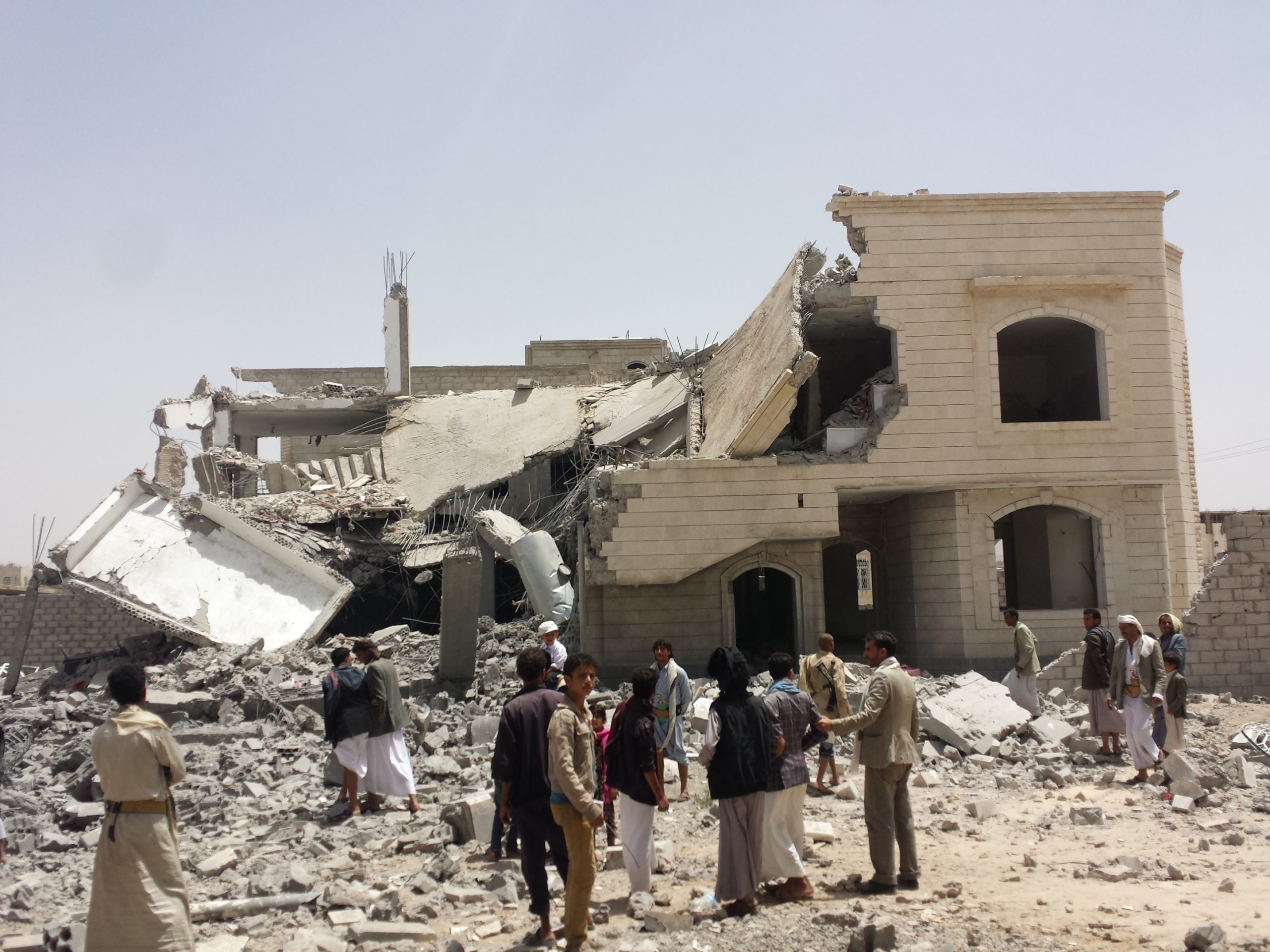Immediately after being sworn into office, the Biden administration announced it was ending all American support for the Saudi Arabia-led war in Yemen, including relevant arms sales. “This war has to end,” he proclaimed, revoking the designation of the Houthis as a foreign terrorist organization (FTO).
China Disengaged From Ladakh To Revive Business Ties With India – Experts
Biden’s decisions on Yemen were, obviously, guided by the global outrage over the years against the mounting humanitarian crisis in Yemen, which lambasted the Saudi-led airstrikes on civilian areas resulting in heavy casualties. The US couldn’t save itself from the immense criticism, being the force behind the Arab coalition that led the assault against the Houthis in the war-torn country.
The coalition is being blamed for creating a famine-like situation in the country with over 80 percent of the population – 24 million people – needing immediate humanitarian assistance and protection. According to the UN, some 20 million people need help securing food, with one charity organization estimating the death of about 85,000 children between 2015 and 2018 due to acute malnutrition.
The UN has verified the death of at least 7,700 civilians by March 2020 in the country, mostly due to Saudi-led airstrikes. However, there are reports of around 100,000 casualties, including more than 12,000 casualties from direct attacks.
However, the Yemeni policy advocates believe the western narrative of the war in Yemen is highly problematic and disconnected from the ground. In the urgency to end the severe humanitarian crisis in the country, an urgent political resolution is being sought, which according to leading Yemeni policy experts, is deeply flawed and reflects a lack of knowledge of the roots of the conflict.
According to them, withdrawing support to the Saudi-led offensive or halting the arms sales will not help bring peace, neither will brokering a power-sharing agreement between the Hadi government and the Houthis.

“Yemen’s conflict is multi-layered and far too complex to be solved with a rushed political agreement. A political settlement under the current circumstances might be a quick win for American and Western diplomacy, but it will most likely reinforce the current power dynamics and lock Yemen into a cycle of perpetual war, bringing 30 million Yemenis closer to famine and pushing the country farther away from peace,” claims the Yemeni conflict analyst Nadwa Dawsari in an article.
She adds that while the Biden administration can successfully put pressure on the Saudi-led coalition and the Yemeni government, it does not have the same leverage on the Houthis, who currently have the upper hand militarily.
“A political settlement, therefore, risks tipping the military balance in favor of the Houthis, who have failed to demonstrate any commitment to cease-fires in the past,” she writes.
Experts say that Biden has revoked the terrorist tag from the Houthis in the hope that they would return to negotiations and reciprocate positive moves. Although former USAID official Dave Harden claims that Houthis will perceive this as a sign of American weakness.
The revocation of FTO designation for the Houthis has angered many Yemenis who say it has given the group the green light to continue their violence against civilians. “Indeed, the very next day after Biden’s decision to revoke the FTO designation, the Houthis mobilized their forces and launched a renewed offensive to seize the oil-rich city of Marib as well as cross-border drone attacks against Saudi Arabia,” Dawsari adds in her article.
The Eurasian Times spoke to Riyadh Al-Dubai, a Yemen-based human rights activist, who says he had to relocate to another Arab country after Houthis attacked his NGO and went after his and his family’s lives.
According to Riyadh, “Yemenis perceive Houthis as an extremist religious Islamic group which feeds and lives on wars just like other extremist Islamic groups around the world, and this is the reality. Yemenis have the right to think of Houthis this way and the reason is that Houthis have militarized the lives of citizens.”
He says that since Houthis took control of the authority in the north of Yemen, they practiced all types of violations such as arbitrary detentions, enforced disappearances, child soldier recruitment, women abduction and violating their rights, torture, blowing up homes and civilian objects, mine-laying, and illegal arrest of journalists, political opponents, and activists.
He says the international press takes no notice of the character of the Houthis who have used every means necessary to inflict violence on minorities, women, and anyone who speaks against them.
“Houthis also persecute minorities in Yemen as they detained Bahai’s, and confiscated their money and property after they forcibly exiled them. They committed violations against all segments of Yemeni society including women, children, and elderly people. There are some tragic stories of women who were detained, tortured, and raped by Houthi leaders.”
He quoted a report by a humanitarian organization, titled ‘SAM – Rights and Liberties’, saying the Houthis have forcibly recruited 10,300 children in Yemen since 2014, adding that the militant group uses “complex patterns to forcibly recruit children and put them in hostile areas under its control in Yemen. As a result, many children were killed and hundreds injured.
Titled ‘Militarizing Childhood’, the report highlights the use of schools and educational facilities by Houthis to lure children to recruitment. “The group uses an education system that incites violence and teaches the group’s ideology through special lectures inside the official educational facilities to fill students with extremist ideas and encourage them to join the fight to support the group’s military actions,” the report claims.
Riyadh claims the militant group has taken the lives of 16,054 civilians in Yemen so far and was directly responsible for injuring 30,000 civilians. It has arbitrarily detained 25,281 and these detainees are still imprisoned.
Houthis stormed some restaurants in Sanaa & forced waitresses to leave. News say they will no longer allow women to work in as waitresses.
Worth mentioning that many women started to work as waitresses when hunger was no longer endured. Those women r the breadwinners now.#Yemen https://t.co/xbBfwxAMdW— Hana alShowafi (@HanaShowafi) January 28, 2021
Last month, the militant group raided women’s clothing shops and cafes in Sanaa, which they say had breached Islamic values by selling western-style outfits. Houthi security patrols raided the clothing stores, destroying clothing shops, mannequins, and accessories.
“Houthis are a radical group just like ISIS. They are as brutal as ISIS and they are trying to create their own Islamic state where women are oppressed and the society is segregated,” The National quoted a conflict analyst on Yemen as saying.
Harrowing to see how #Houthis have increasingly tried to box #Yemen-i women in– from dress regulations, to trying to separate educational + training activities, to nonsense allegations of mixing, to all the other ways conflict abuse has impacted women… #YemenCantWait https://t.co/gjvuDHds00
— Kristine Beckerle (@K_Beckerle) January 28, 2021
Do Yemenis Support The Saudi Intervention?
On a question whether the Saudi-led airstrikes had support from the Yemenis, Riyadh said that all the areas freed from the militant group support the Saudi intervention. While in Houthi-controlled areas, people fear speaking against the group as it could lead to incarceration and torture.
All in all, he said, there is criticism of the airstrikes which resulted in many casualties, but most Yemenis also believe the Saudi intervention to be essential to liberate the areas controlled by the Houthi group.
“Despite Biden’s implicit effort to characterize this as a brutal Saudi assault on an impoverished country, the central problem is Iran and its proxy, the Houthis. Biden’s decision to inhibit the Saudis and placate the Houthis will not contribute to peace, but will instead inspire the latter to further stiffen their position,” writes John Bolton, former assistant to the President for National Security Affairs (NSA), in New York Daily.
He adds that the White House justifies its policy by citing humanitarian concerns, ignoring that Iran and the Houthis, far better at ideological propaganda than their opponents, are cynically manipulating Yemeni civilians and foreign aid workers for their own strategic purposes.
Now, Saudi Arabia is gradually decreasing the extent of airstrikes in Yemen, with its strategy shifting from hard intervention to soft intervention. The number of such airstrikes has decreased from around 7000 in the first year of the war to now about 1200 in 2019, mostly now concentrated around the border areas with Yemen rather than the mainland.
Leading Middle-East experts say that Saudi Arabia is trapped in the war for a considerable time as there is no easy option of either pulling out or deepening the offensive against the Houthis. “Even if future US actions are in Saudi Arabia’s interest, the security cost of leaving Yemen is more than the cost of staying there,” writes Ahmed Nagi for Carnegie Middle East Center.




